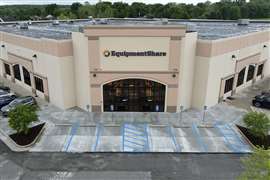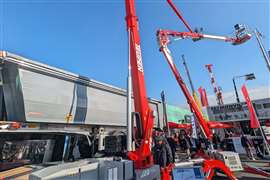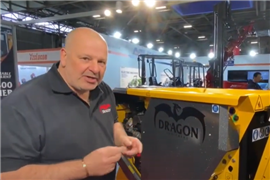Making a start: Murray Pollok reports on the Indian rental scene.
16 October 2009

There are lots of areas of the world that offer rich potential for the development of rental, in fact, pretty much everywhere outside of western Europe, North America, Japan and Australia.
But there is one country in particular that is attracting a lot of interest, and that's India. There are some obvious reasons for this: it's vast size, the continued high growth rates of its economy, and more to the point, the massive spending plans on infrastructure and industry that are anticipated in the coming decades.
But like any developing market, the challenge is in realising that potential. One man with a unique perspective on the country's fledgling rental sector is Philippe Clover, the ex-Hertz Europe and Cat Rental Store veteran who in April 2008 began a new chapter in his career as president of India's largest equipment rental company, Quippo Infrastructure Equipment Ltd (part of the SREI Infrastructure Finance group).
"Rental today in India has many very small, unorganized players", Mr Clover tells IRN, speaking from Quippo's head office in India's capital city, New Dehli, "It's very fragmented, and companies are operating in a chaotic but growing market. I'm convinced there is a huge potential demand."
The basis for that demand is the scale of India's investment plans, says Mr Clover, with something like US$384 billion worth of infrastructure spending planned between now and 2012.
But before rental companies get too excited about the opportunities, Mr Clover has some hard truths to spell out. First of all, forget the notion that rental in India resembles rental in developed European or American markets. For one thing, compact equipment isn't used to any significant degree in the country - Off Highway Research, for example, estimates that just 64 mini excavators were sold in India last year, almost no telehandlers, and around 400 skid steer loaders.
"Compact equipment is a no-go area", says Mr Clover, "There is still the battle between the cost of labour and the cost of machines. It's still cheaper to employ people, and productivity of jobsites is less of a factor. There is also a social need [for labour]. India's population is 1.3 billion plus - the system has to provide ways for people to earn an income."
That means that rental is still targeted mainly at larger equipment, and almost exclusively with an operator (even compressors are often rented with operators.) In Quippo's case, this means a fleet of excavators from around 17 t upwards, compaction equipment from 15 t and higher, as well as backhoe loaders (a very popular product in India), bulldozers, motor graders, concrete pumps and boom trucks. (The company also stocks lighting towers, generators, concrete mixers and a few aerial work platforms.)
The dominance of ‘wet hire' can also hinder the development of the rental concept, as Mr Clover explains; "Renting equipment with an operator means that confusion exists with some customers. At times, they expect renters to act as contractors - this is where the new Indian Rental Association has a lot of work to do in helping to educate the market."
Rental still has a long way to go before it is fully accepted by India's largest contractors. Mr Clover says that, while all except one or two of the country's top ten contractors use rental companies, it is still in a small scale way. "They have huge fleets of owned equipment - they already have a fixed cost structure dedicated to maintaining the fleet.
"Rental penetration will take some time", he continues, "The message is getting through bit by bit, that all these fixed costs don't make sense for a good number of machines. They will gain efficiency if they stop renewing fleets and start relying more on rental."
Another key obstacle to rental is India's Federal structure, with 28 states and a further 7 union territories. The issue here is the bureaucracy involved in shifting equipment across state borders, and the various entry, VAT and service taxes imposed by federal and state authorities. State entry taxes alone can be as high as 2 to 10% of machine value.
This, says Mr Clover, means that movement of machines is restricted but for the very largest projects. "You have to adapt your business", he says, "most of the time you have to focus on local customers and limit interstate movements of machines."
This also complicates equipment maintenance and servicing, already an area made difficult by the sheer scale of the country and the sometimes less than fully developed equipment dealership networks.
This is one reason why Quippo and several of the larger Indian rental companies favour new machines. Mr Clover says Quippo's model is to keep most machines for four or five years, which increases reliability on site and helps reduce the burden of maintenance and repair.
Given the size of the country and the bureaucratic challenges, it is control of assets - keeping track of things like costs of repair and maintenance - that Mr Clover sees as a key factor in being successful in India. "If you don't control your assets, you will be lost. You have to be very disciplined - this is what we are working on internally, pulling together these fundamentals".
The issue of taxation and red tape is one mentioned also by Rajiv Sethi, founder and managing director of Mumbai-based Gemini Equipment and Rentals, and K N Bhat, general manager for rental and used equipment at Caterpillar dealer Gmmco, which runs eight Cat Rental Stores in the southern and western territories of India.
Gmmco's Mr Bhat says that in addition to the issue of excessive red tape, long payment times are an issue, with customers often taking 90 to 100 days before making payment. "That's a big problem", says Mr Bhat, "We are working on it. We have started to stop the machine if they don't pay. If necessary, we take back the operator and take away the key."
The new Indian Rental Association crops up several times in conversations with Indian rental managers. The organisation was founded last year under the chairmanship Gemini's Mr Sethi. Gemini was formed in 2007 as an offshoot from Mr Sethi's equipment dealership business.
The association started with six members - Gemini, Quippo, Gremach and Jindal Earthmovers, as well as two Caterpillar dealers, Gmmco and TIL. Mr Sethi says the association is still in its early days, but that the intention is for it to coordinate lobbying activities to address some of the issues mentioned previously, as well as to help promote rental, acting as a kind of rental "missionary".
Quippo's Mr Clover agrees that the association can play a key role in helping to promote rental and create a professional business. "We want to push very open behaviour, pull together a set of good practices, to create a good platform to grow." One example is the creation of a standard rental agreement.
Meanwhile, the growth of India's rental sector has been impacted by the global economic slowdown, which has not bypassed India. Off Highway Research forecasts that sales of all new equipment in India will be down 22% this year, before rebounding in 2010. Even so, all the rental companies spoken to by IRN were optimistic that things will get busy again after the end of the monsoon season which runs from June to September. "Projects will start again in October", says Gmmco's Mr Bhat, "I expect demand to pick up tremendously."
Before it does, Gmmco's fleet of around 330 machines will operate at utilisation rates of close to 50%. Mr Bhat says Gmmco's rental business has been expanding at 20-30% annually in recent year, with revenues now approaching $5 million. With eight depots at the moment, the company will open three new locations in Goa, Indore and Cochin by the end of this year.
Gmmco has been investing heavily in its fleet, over $7 million last year and Mr Bhat says the spending will reach around $4 million this year, with a particular focus on large mining excavators, wheeled loaders and bulldozers, including 45 t Cat 345 excavators and D5 and D6 dozers. The operation also includes power rentals, with a fleet size of 19.3 MW.
Geographically, the areas of greatest growth are spread around India. Both Quippo's Philippe Clover and Gemini's Rajiv Sethi agree that the states of Andhra Prudesh, Maharashtra and Gujarat offer big opportunities, while Mr Clover also points to nuclear power plants in Rajasthan and also the north eastern States. Quippo already has an extensive network of locations throughout India.
Mr Sethi, who also anticipates "a huge spend" when the monsoon season ends, adds the Northern Capital Region around Dehli has a good area. He says Gemini has so far pulled back from opening up in the north eastern states that includes Kolkata (formerly Calcutta). "We will go there when things look up", says Mr Sethi, which could mean an opening around April 2010, "You need good business ahead for two to three years to establish a new depot here."
"The real estate market in India has taken a large beating", says Mr Sethi, "but it will definitely bounce back. And project cycles will get shorter, and mechanization will take on more importance."
As it does, the lure of India will increase. Already big rental names, including Hertz, have expressed interest in the market and others are sure to follow. Their presence will not be unpopular, as Mr Clover says, "Anybody who wants to promote rental is welcome."
BOX STORY
‘Modest' plans
Philippe Clover wants to grow Quippo's equipment rental business - it is currently in the $15-20 million turnover bracket - but he is wary of expanding beyond the company's capacity.
"I do expect to grow next year, for sure, but in a reasonable fashion", he tells IRN, "We could be tempted to invest beyond our control. We have to be modest."
Since arriving as president in April 2008, Mr Clover's priorities have been to introduce tighter management controls and making sure that everyone in the team is working together. "At the moment we are working to maximize fleet utilization, and rationalizing the whole business - putting together performance metrics, training people, reinforcing the skill sets. Once we are a team and working satisfactorily, then we will make investments."
When these investments come they will likely include a diversification of the product range into areas that are new to Quippo, including industrial forklifts and portable accommodation, both of which could be added as early as next Spring.
Mr Clover also sees potential to grow Quippo's small aerial platform fleet. "If I redeploy and renew the fleet, I will certainly look at AWPs as an opportunity. Our existing AWP fleet has very good utilization", he says, "There are more and more sophisticated buildings and more warehouses. And you also see more maintenance opportunities, at airports for example. The need will grow." There is, as yet, a tiny market for telehandlers, with a big obstacle being the fact that materials are not palletised.
Applying in India what he learnt during a 30 year career in rental in Europe and the US is proving an enjoyable task; "Sharing a vision and making sure that everyone works towards the same goal can be a challenge", he says, "but it's great fun at the same time."
BOX STORY
Indian rental
Rajiv Sethi, chairman of the Rental Association of India (RAI), tells IRN that equipment rental businesses in India generate around €130-175 million worth of rental revenues every year.
He says that the majority of this is generated by "unorganized and smaller players", with the more formal operations - companies like Quippo, the Caterpillar dealers and his own Gemini company - representing around €45 million in revenues.
In terms of rental penetration - the proportion of equipment sold directly to rental companies - Mr Sethi says that around 7-8% is the accepted current estimate.






